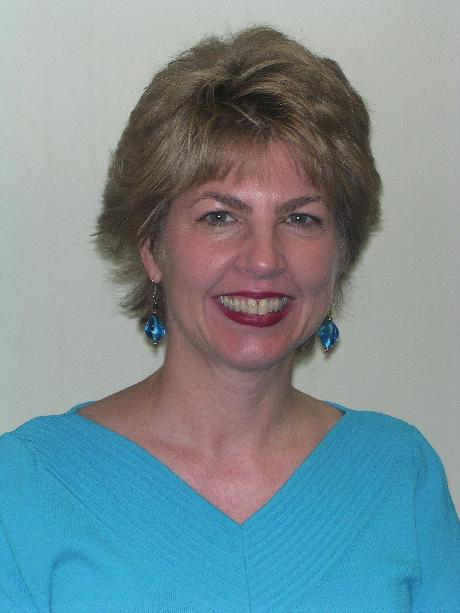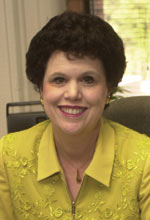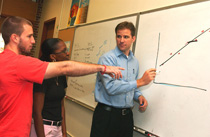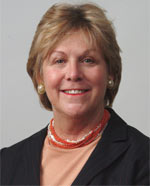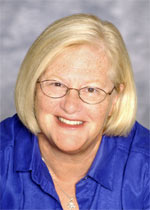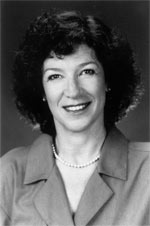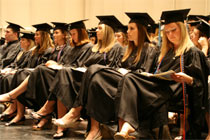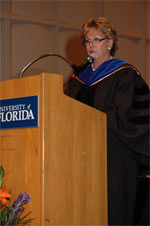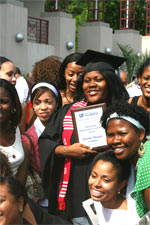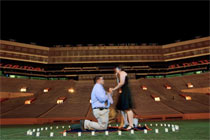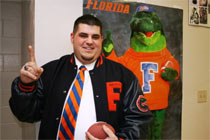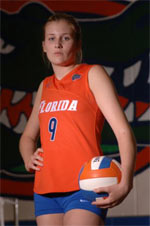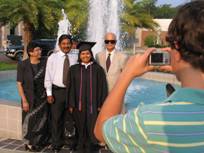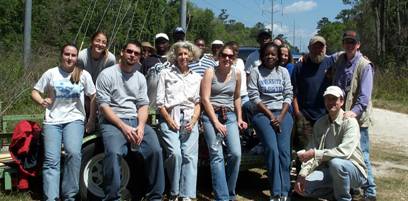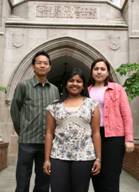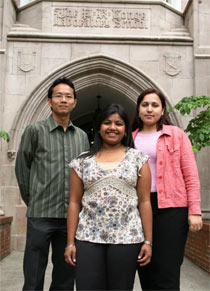coE-News: January 15, 2008, VOL 3 ISSUE 4
VOL. 3, ISSUE 4
Jan. 15, 2008
You’re reading coE-News, an electronic newsletter produced
monthly during the academic year by the College of Education News &
Publications Office to keep faculty and staff up-to-date on college
news and activities. Click here to download a PDF version of this edition. You will need a PDF reader to view this document.
GOT NEWS? We want to hear it. Submit individual or unit news and calendar events of collegewide interest to news@coe.ufl.edu
for publication consideration. All submissions must be in writing or
via e-mail and must include contact information for follow-up
questions.
* * * * * * * * * *
IN THIS ISSUE:
* * * * * * * * * *
DEAN’S MESSAGE
Why we will thrive— through thick and thin
Times have been
tough. Here at UF, budgets have been trimmed. Out there, schools are
groaning under the weight of student poverty. Still, Dean Catherine
Emihovich sees something inspiring in the spirit that sustained the
college through 2007—a spirit that will go out into the world and
make it a better place. (more)
* * * * * * * * * *
TOP STORIES
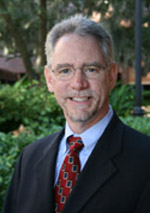
COE taps one of its own as associate dean for academic affairs
Professor Tom Dana, director of the School of Teaching and Learning,
has been selected to succeed Jeri Benson as associate dean for academic
affairs. The self-described “technology and data geek” will take over
COE’s No. 2 position in July. (more)
Couple gives COE $600,000 to carry on tradition of middle-grades reform
The College of Education has been a leader in the middle school
movement since its beginning. Now Gainesville residents Fred and
Christine Shewey have given the college a major gift that will help UF
pioneer the next generation of middle-school reform. (more)
* * * * * * * * *
NEWS AND NOTICES
China: the Next Educational Frontier
They’re the world’s most populous nation, they excel at producing
science and mathematics graduates, and they have hundreds of years of
experience with high-stakes testing. What can we learn about education
from China, and what can China learn from us? Faculty are invited to
share their experiences teaching, learning and researching in the
People’s Republic of China, in a Brown Bag Lunch hosted by Dean
Catherine Emihovich, to be held Feb. 11 from noon-1:30 p.m. in the
Norman Terrace Room. You bring the brown bag lunch; the Dean’s office
will provide drinks and dessert.
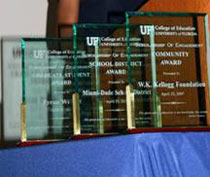
Scholarship of Engagement nominations open
It’s always hard to pick winners for COE’s annual Scholarship of
Engagement Awards. After all, Norman Hall is filled with accomplished
scholars who are putting top-notch research skills to work on the
community’s most troubling problems. Please help the college narrow
down the field: if you know someone whose socially-engaged research
stands above even COE’s high standards, you have until Feb. 22 to
nominate them. Go here for more details.
Learn about new professional practice doctorate
UF is part of a multi-university effort to reshape the Doctor of
Education degree into a professional practice doctorate that better
fits the needs of 21st Century educators. If you want to learn more
about professional practice doctorates—and how other research
universities have devised their degree programs—a panel of experts
will discuss these issues in a teleconference Jan. 25 from 1-3 p.m. in
the Terrace Room. Presenters include David Marsh of the University of
Southern California and a panel of scholars from Vanderbilt University.
Attendees can submit questions in advance of the meeting to syraj@ufl.edu or Hagedorn@ufl.edu.
Beta Chapter offers new ways for counselor educators to connect
UF’s Counselor Education students and faculty are well-known for their
desire to change the world for the better. Check out the latest issue
of the Beta Chapter Bulletin
to find out how they are making that change. Published by the local
Beta Chapter of Chi Sigma Iota International, the international honor
society for counselors and counselor educators, the newsletter is
available on the Counselor Education Web site (go to https://education.ufl.edu/counselor-education/
and look under Current News). Featured in the current issue: an
overview of the department’s work in Africa, a profile of retiring
counselor education Professor Larry Loesch and an update on the
chapter’s fundraising efforts.
Bring cutting-edge linguistic research into your classroom with new lecture series
If you teach anything related to language—writing, reading, speech or
the whole gamut of subjects that draw on those skills—you’ll want to
attend the “Contemporary Issues in Secondary Language Acquisition”
series this semester in Dauer Hall. Organized by COE Assistant
Professor Maria Coady and faculty from UF’s Linguistics and Romance
Languages Programs, the series brings accomplished linguists to UF to
discuss cutting-edge ideas about the ways humans learn and process
language—and to discuss how those insights can be applied in the
classroom, particularly with second-language learners. The first
speaker, Elaine Tarone of the University of Minnesota, will speak at
Dauer Hall at 4 p.m. Thursday, Jan. 17, followed Jan. 31 by Jim Cummins
of the University of Toronto. More information is available here.
Commencement Awards nominations due Jan. 25
Do you know a COE student or recent graduate who deserves to be honored
for their scholarship or public service? At the college’s May 3
commencement, COE will honor outstanding students who graduated in
Summer 2007, Fall 2007 or Spring 2008. Faculty have until Jan. 25 to
nominate students for the Commencement Awards. Applications are
available here, and must be turned in to the Student Services office in G416 Norman Hall. For more information, call 392-0721 x400.
Support first-generation college students through CROP doughnut sale
The College Reach-Out Program (CROP) is holding a Krispy Kreme doughnut
sale to raise funds to help middle and high school students from low
socio-economic backgrounds visit educational sites and college
campuses. You can buy doughnuts for $5 per box in the CROP office in
G-415 Norman Hall. The sale ends Jan. 31 and doughnuts will be
delivered Friday, Feb.1.
* * * * * * * * *
FACULTY/STAFF HONORS/APPOINTMENTS
Snyder appointed to editorial duties
Patricia Snyder, holder of the David Lawrence Jr. Chair in Early
Childhood Studies, has been appointed an associate editor for the
journal Topics in Early Childhood Education. She also was appointed on Jan. 1 as a consulting editor for the American Journal on Mental Retardation (AJMR). Snyder recently completed her final issue of Journal of Early Intervention, which
she edited for five years during her tenure at Louisiana State
University Health Sciences Center and Vanderbilt University. In
addition to these assignments, Snyder is currently a member of the
editorial boards of Infants and Young Children, Young Exceptional Children, and Educational and Psychological Measurement.
* * * * * * * * *
STUDENT AWARDS AND HONORS
Doctoral student named Teacher of Distinction
Nicole Bien, a 10-year veteran of the special education classroom and
UF doctoral student, was named a Collier County Teacher of Distinction
in late November. The honor includes membership in the Collier Schools
Teacher Academy (the district’s teacher leader program) and a $1,000
honorarium which Bien will use on a project with her school community.
Bien is pursuing a doctoral degree in special education administration
through UF’s Project EXCEL.
Orlando gets Karen Koegel scholarship
Doctoral student
Ann-Marie Orlando is this year’s recipient of the Karen Koegel
Scholarship, awarded annually by COE’s Department of Special Education
to one student who provides leadership in the field and produces
scholarship that makes a difference in the lives of people with
significant disabilities. Orlando’s research investigates the use of
assistive technology in literacy development for children with
significant disabilities.
Five win Minority Teacher Education Scholarships
Five ProTeach students have been awarded the Minority Teacher Education
Scholarship by the Florida Fund for Minority Teachers. The recipients –
Jeffrey Andre of Boynton Beach, Kristina Barkus of Deland, Chandani Bhakta of Orange Park, Kia Cheers of Pompano Beach and Frances Arrebola-Llopiz
of Coral Gables—will receive $2,000 per semester while completing
their undergraduate work. Current UF students and transfer students are
selected for the scholarship through a competitive process involving
analysis of transcripts and a personal essay. Winners are required to
teach in a Florida school upon completion of their degree.
* * * * * * * * *
PUBLICATIONS/PRESENTATIONS
COE doctoral students bring classroom democracy to conference
Democracy
and the 2008 elections took center stage when six COE doctoral students
presented their classroom practices to secondary social studies
teachers from all over the country at the annual conference of the
College and University Faculty Association/National Council for Social
Studies in San Diego Nov. 28. Bob Dahlgren, Sheryl Howie, Emma
Humphries, Cheryl Kmiec, Michele Phillips, and Steve Masyada, all of
whom work with Professor Elizabeth Yeager of the School of Teaching and
Learning, shared their methods for establishing a democratic classroom,
using critical media analysis to examine political ads, creating a
political campaign and critically analyzing referendum and ballot
initiative proposals.
Hagedorn offers expertise—from Iowa to India
Presidential hopefuls weren’t the only people flocking to Iowa in
December 2007. Professor Linda Serra Hagedorn, chair of COE’s
Department of Educational Administration and Policy, traveled to Iowa
State University over the break to offer a workshop on “Understanding
Community College Students” to the doctoral candidates in Iowa State’s
respected Community College Leadership program. Hagedorn also answered
a call for help from across the globe: the University of Madras
recently asked her to be external reviewer for a dissertation on
India’s community college system.
Presentations
Clark, M.A. (2007, November). Examining the Gender Gap in Educational Outcomes in Public Education: Implications for School Counselors. European Branch of the American Counseling Association Annual Conference: Bad Herrenalb, Germany.
Clark, M.A. & Stone, C.B. (2007, November). Leaving No Child Behind: Issues and Trends in 21st Century School Counseling. European Branch of the American Counseling Association Annual Conference: Bad Herrenalb, Germany.
Clark, M.A., Dahir, C., Burnham, J. & Portman, T.A. (2007, October). The Changing Dynamics of 21st Century School Counseling. Poster presented at national conference of the Association of Counselor Educators and Supervisors. Columbus, Ohio.
Clark, M.A., Yacco, S. & Rant, J. (2007, November). Examining Male Underachievement in Public Education: Parental and Educator Perspectives. Florida Counseling Association Annual Conference. Daytona Beach.
Publications
Puig, A. & Adams, C. (2007). Introducing spirituality into multicultural counseling. In W.M. Parker & M.A. Fukuyama. Consciousness raising: A primer for multicultural counseling (3rd Ed.), pp. 181-203. Springfield, Illinois: Charles C. Thomas Publisher.
Lee, S.M., Puig, A., Pasquarella Daley, L., Rai, A.A., Dallape, A.,
& Parker, M. (2007). Revising the White Racial Consciousness
Development Scale. Measurement and Evaluation in Counseling and Development, 39, 4, 194-208.
Lee, S. M., Puig, A., & Clark, M. A. (2007). The role of religiosity on postsecondary degree attainment. Counseling and Values Journal, 52, pp. 25-39.
* * * * * * * * *
P.K. YONGE NEWS
PKY research to create new options for struggling readers
Intensive reading intervention classes are supposed to help struggling
readers master the fundamentals before moving on to higher level work.
But many Florida educators worry that the system is dooming these
students by exposing them to the same instructional approach again and
again—even when it isn’t working. P.K. Yonge Developmental Research
School is looking for a way to break the cycle with Project CHOiCE,
which researches new approaches to teaching struggling readers. (more)
* * * * * * * * *
IN THE NEWS
A recent sampling of “media hits” from the College of Education:
The (Nashville) Tennesseean—Professor and Chair James McCleskey, Special Education (12/01/07) In
a story on the high number of children in special education classes in
Tennessee, McLeskey was quoted as saying that, under No Child Left
Behind testing requirements, school districts feel pressure to move
low-performing students out of the general classroom.
The Gainesville Sun—Director Bernie Oliver, UF Alliance (12/02/07) Oliver
was quoted in a story about the annual conference of the Anti-Racism
Coalition at Duval Elementary School. Oliver urged students and
teachers to stand up and challenge people who express “warped ideas”
about race in the classroom.
The Chronicle of Higher Education—FloridaTeach Program (12/19/07) The
College of Education’s new teacher preparation program for science and
mathematics teachers was mentioned in a lengthy article on similar
programs being adopted across the country—all modeled on the
University of Texas-Austin’s successful UTeach program. The program was
also mentioned in stories in the Arizona Daily Sun and the Dallas Morning News.
Education Week—Professor Candace Harper (12/05/07) Harper
was quoted in a story about a study that assessed the nationwide state
of testing to evaluate the progress of English language learners.
Citing her own studies—which found some Florida schools administering
tests over a loudspeaker while others were administered by individual
teachers—Harper said that some states’ test results might be invalid.
Daytona Beach News-Journal – Associate Professor Stephen Pape (12/24/07) Pape
was quoted in a story on American students’ lackluster performance on
international measures of mathematics achievement—and its possible
links to the lack of qualified K-12 teachers. Pape noted that the
traditional “direct instruction” approach does not work for all
students.
Counseling Today – Assistant Professor Cirecie West-Olatunji and Professor Edil Torres Rivera (12/01/07) West-Olatunji
and Torres Rivera provided their insights on race relations in
academia, as part of a feature article inspired by recent race-related
incidents including the Jena Six controversy and the hanging of a noose
on a professor’s office door at the Teachers’ College at Columbia
University.
Dallas Morning News—Professor and Chair Linda Serra Hagedorn (12/27/07) Hagedorn’s
study on “course-shopping” among college students was mentioned in an
article on a Texas law that limits students to six dropped classes
throughout their college careers.
* * * * * * * * * *
CALENDAR
JAN. 17
“Rethinking SLA Data Collection: Dealing with Naturalistic Learners”
Elaine Tarone, University of Minnesota
4 p.m., Dauer Hall
Contact: Maria Coady, mcoady@coe.ufl.edu
JAN. 21
Martin Luther King, Jr. Day
JAN. 23-27
Holmes Partnership Annual Conference, Orlando
JAN. 25
Panel Discussion on the Professional Practice Doctorate
1-3 p.m., Norman Terrace Room
Contact: Linda Serra Hagedorn, Hagedorn@coe.ufl.edu; 352-392-2391 x263
JAN. 29
Elections—Presidential Primaries, Ballot Measures & Gainesville City Commission
JAN. 31
“Rethinking the Scientific Basis for Literacy Instruction”
Jim Cummins, University of Toronto OISE
4 p.m, Dauer Hall
Contact: Maria Coady, mcoady@coe.ufl.edu
FEB. 7-10
AACTE Annual Meeting, New Orleans
FEB. 11
“China: the Next Educational Frontier”
Faculty Brown Bag Lunch with Dean Catherine Emihovich
Noon- 1:30 p.m, Norman Terrace Room
FEB. 21
Education Career Night
7-8 p.m., Reitz Student Union
Contact: jmount@coe.ufl.edu or (352) 392-0728, ext: 250
* * * * * * * * * *
ANNOUNCEMENTS

Minority recruitment and retention event coming up
If you
know a school administrator who is trying to improve faculty diversity
– or an education student of color who is looking for a position—let
them know about the upcoming Recruitment and Retention Conference, to
be held April 6-8 by the Florida Fund for Minority Teachers. The
conference was developed to assist school districts in identifying and
recruiting high quality minority teachers. This year’s event will be
held at the Rosen Plaza Hotel in Orlando, and will feature scholarship
recipients from 33 public, private and independent institutions,
presenters on various topics, and pre-professional development
workshops for community college students entering the profession
through the Minority Teacher Education Program. To date, the Florida
Fund for Minority Teachers—headquartered here at Norman Hall—has
brought 2,500 new teachers into Florida’s schools. For more information
about the conference, contact Cheryl D. Williams at (352) 392-9196.
Save the date: respected series on death education returns in April
University of Chicago professor Froma Walsh, creator of a
research-based system for helping families endure grief and loss, will
be the featured speaker in this year’s Peterson Death Education Series,
to be held April 17 at the UF Hilton Conference Center. The lecture
series, one of the nation’s first on end-of-life issues, got its start
at UF more than 30 years ago under the direction of former COE
Professor Hannelore Wass, a leading researcher in the field of death
studies. For information on the lecture, contact Ana Puig in the
College of Education at anapuig@coe.ufl.edu or 392-2315, ext. 235.
* * * * * * * * * *
QUICK LINKS
UF: www.ufl.edu
College of Education: education.ufl.edu
coE-News: Publications
Education Times magazine: Publications
* * * * * * * *
coE-News is produced by:
College of Education, University of Florida
Dean’s Office/News & Publications
Dean: Catherine Emihovich (cemihovich@coe.ufl.edu)
Director: Larry Lansford (llansford@coe.ufl.edu)
Editor: Tim Lockette (lockette@coe.ufl.edu)
Correspondents:
Wendy Norman, Copy Editor
Marta Pollitt, P.K. Yonge (mpollitt@pky.ufl.edu)

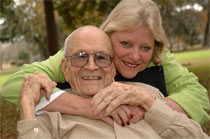
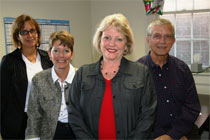
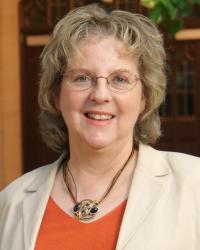
 Joyce Tardaguila-Harth
Joyce Tardaguila-Harth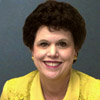 Linda Sera Hagedorn
Linda Sera Hagedorn Maria Coady
Maria Coady Stephen Smith & Ann Daunic
Stephen Smith & Ann Daunic

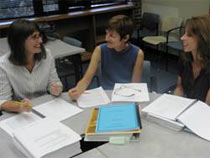
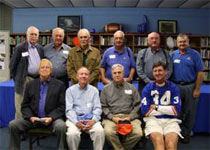
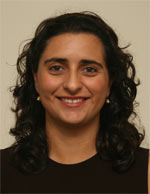 Mendoza
Mendoza

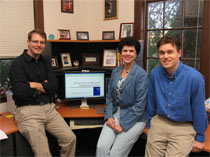

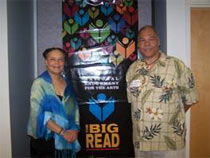




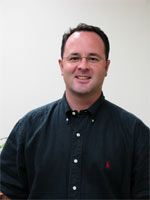
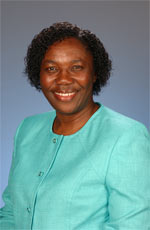
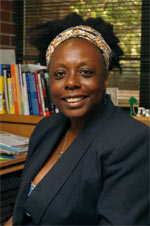
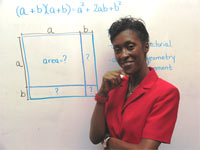
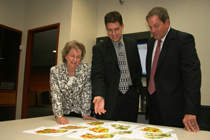
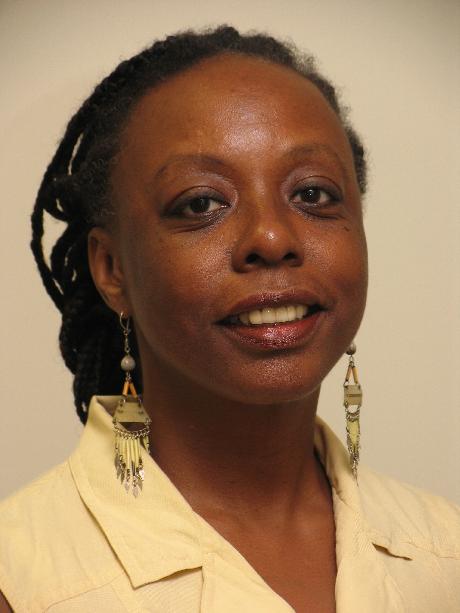
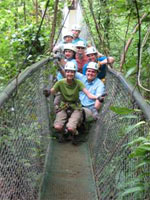

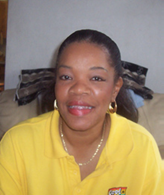 Archer-Banks
Archer-Banks
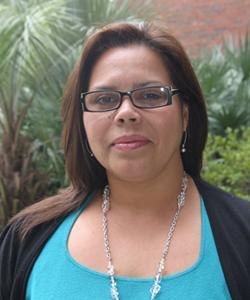 Melendez
Melendez


